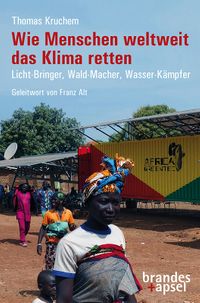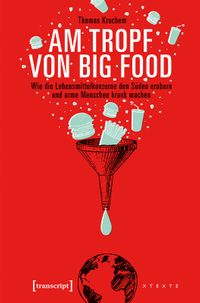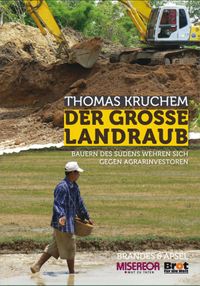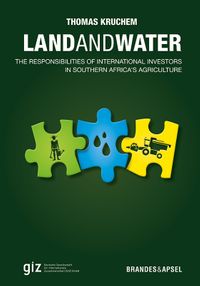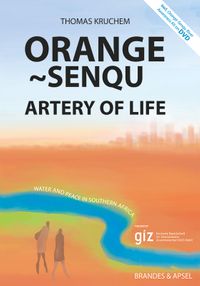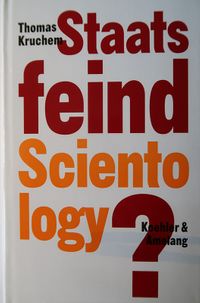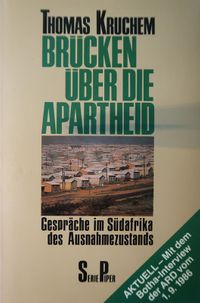BOOKS
Thomas Kruchem:
Wie Menschen weltweit das Klima retten.
Frankfurt 2020.
Every day, media reports on climate change disaster come crashing down on us; we could lose all hope. But there are people, far removed from the world public, who act decisively under often the most adverse circumstances and make impressive achievements to protect our climate.
The award-winning journalist and development expert Thomas Kruchem visited six successful initiatives. He tells gripping and richly illustrated stories about how solar power is helping villages in Mali to flourish, how citizens of La Paz are arming themselves against water shortages, how people in Niger and Ethiopia, in Haiti and Scotland are creating new forests and new agriculture, and how slums in Manila are being transformed into climate-safe residential areas.
"I wish this book of hope many readers."
-Franz Alt
Thomas Kruchem:
Am Tropf von Big Food.
Bielefeld 2017.
Sonderausgabe für die Bundeszentrale für politische Bildung. Bonn 2018.
The World Health Organization is sounding the alarm: Big Food, the multinational food industry, is even more dangerous than the tobacco and alcohol industries. The corporations are now aggressively conquering poor countries and pushing malnourished mothers and their children to consume disease-causing junk food – instant noodles, cookies, chips, sugary drinks. The result: an obesity pandemic – in China alone, 1.3 million people died of diabetes in 2016. No doubt: Big Food makes huge profits on the backs of the poorest. This must be fought – but how?
Thomas Kruchem reveals how Big Food uses emergency aid for its purposes and silences critics; how corporations finance UN organizations, aid agencies like Oxfam, and scientists with millions of dollars. Against these practices of Big Food he finally proposes ten concrete political countermeasures.
“Thomas Kruchem puts his finger in open wounds."
Biraj Patnaik, leader of the Indian Right to Food Campaign
"A disturbing and rousing book. It calls on us all to put a stop to the scandalous business practices of the food and beverage multinationals."
Thomas Gebauer, CEO of medico international e.V., Co-recipient of the 1997 Nobel Peace Prize
"In the post-factual age, the critical public desperately needs such books."
PD Dr. Dr. med. Sabine Gabrysch, Deputy Director of the Institute of Public Health at the University of Heidelberg
Thomas Kruchem:
Der große Landraub.
Frankfurt 2012.
Like locusts, international investors are currently plunging into arable land in poor countries; it is all about agro-fuel, feed and food for export. Powerful local people are holding the door open, hoping for foreign exchange and good business. But how do small farmers and indigenous people experience the investors' land grabbing?
Thomas Kruchem has researched in Uganda, Cambodia, Argentina, the Philippines and Ethiopia. He came across a nightmare: tens of thousands of people are cheated off their land and displaced by force of arms; their forests are cut down, their children poisoned by pesticide planes.
There is no doubt that large-scale agricultural investments can cause social and ecological disasters – if strict rules do not protect people's rights and the environment. More and more affected people and international civil society are fighting for such rules and for sustainable agriculture in developing countries.
Thomas Kruchem:
Land and Water.
Frankfurt 2013.
Year after year, southern Africa is blanketed by palls of smoke. Traditional agriculture here is destructive for the soils and forests of the region and for the world’s climate. Millions of agricultural smallholders are starving, even though the land and water available to them should be more than suffi cient for their needs. Governments and development agencies have made repeated efforts to modernize the region’s agriculture but have failed.
Can foreign investors now come to the rescue as “saviours in the hour of need”? Or are such investors just grabbers of land and water who push Africa’s farmers even deeper into misery? Southern Africa’s agriculture is at a crossroads.
Thomas Kruchem’s first-hand account breaks common patterns of thinking. It supplies a panorama of African reality, which all too frequently is obscured by whitewash or stereotypes laden with ideology.
Thomas Kruchem:
Orange-Senqu – Artery of Life.
Frankfurt 2012.
San of the Kalahari; mountain farmers in Lesotho; township activists near Johannesburg; diamond miners at the mouth of the Orange River; scientists and eco-philosophers – these are just a sampling of the scores of people interviewed by Thomas Kruchem to tell the rich and multi-faceted story of this great African river. It is a story steeped in cultural history, economic opportunity and overwhelming environmental challenge.
And the whole thing is told against the backdrop of a global problem – the escalating shortage of potable water. Water shortage is one of humanity’s greatest challenges. It comes into sharp focus through the real-world issues faced along the river named Orange in South Africa and Senqu in Lesotho. In addressing these issues this compelling and beautifully illustrated book is part travelogue, part in-depth analysis and part a compendium of touching stories. The attached Orange-Senqu River Awareness Kit on DVD provides comprehensive multimedia material on water issues in Southern Africa.
Thomas Kruchem:
Staatsfeind Scientology.
München 1999.
Hardly any other organization has been perceived and described as such a threat as Scientology. State and society have taken many protective measures in recent years.
What dangers emanate from Scientology? Why do jurisdiction and science arrive at different assessments? Why do critical voices warn against excessive measures against a perhaps just unpopular religious-ideological minority?
Politicians, lawyers, psychologists and religious scientists, dropouts and members of Scientology, right up to the "chief of their secret service" take a stand in 32 interviews. The interviews are supplemented by a detailed glossary and an extensive documentation of Scientology materials, official documents and court decisions.
Thomas Kruchem:
Brücken über die Apartheid.
2. Auflage 1986.
In the middle of a state of emergency, journalist Thomas Kruchem travelled through South Africa – in search of the political future at the Cape of Good Hope.
Microphone in hand, he asked – in the offices of black trade unions as well as in the office of the white "Konserwatiewe Party". With black students he fled from the police, with whose boss he met the next day. Kruchem met the ANC spokesman Joe Jele in exile and in one of the homelands the leader of the movement "Inkatha” Gatsha Buthelezi. The office of South Africa’s president was the scene of his talks with political leaders – and the backyard office of the aid organization "Black Sash".
The result is the talks that are presented in this book. They document contradictions and complexity. Against the backdrop of questions posed in an undercooled manner, the multi-faceted South Africa of those who will leave their mark on it emerges.
Thomas Kruchem does not want to offer hasty answers or solutions, but to let the people living there have their say.
Frankfurter Rundschau.
"A vademecum for people interested in South Africa."
Neue Zürcher Zeitung.
"Worth reading and informative."
Evangelische Information.
